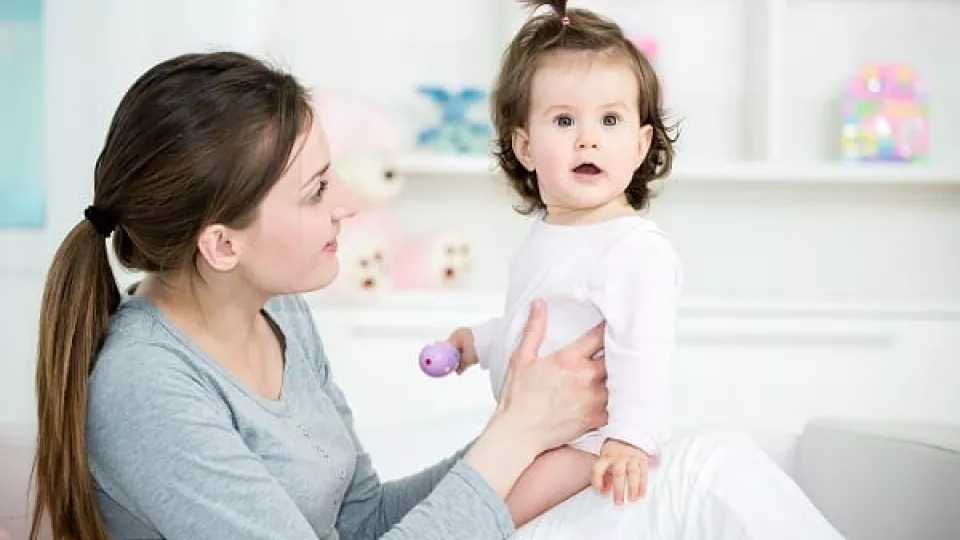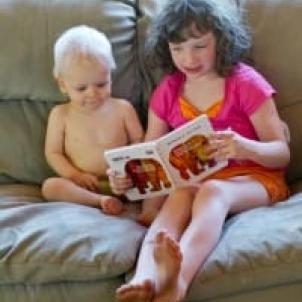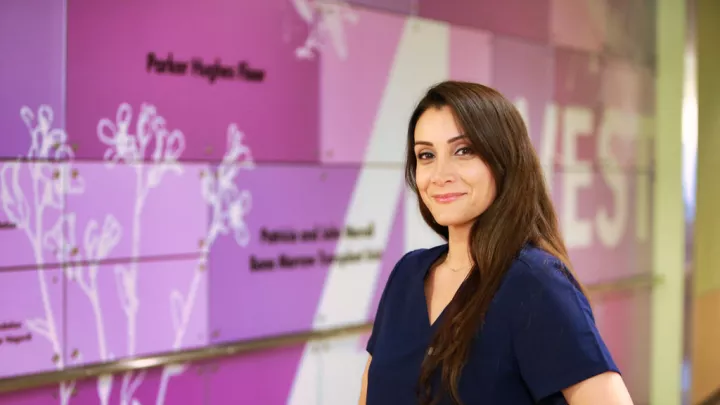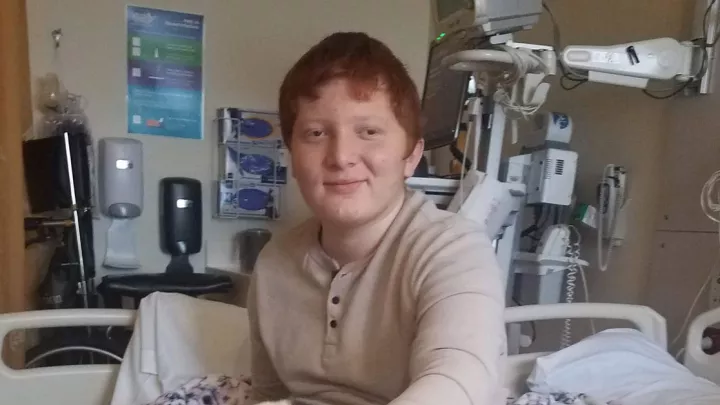
Help Your Child’s Language Development
I was picking my kids up from day care the other day. I asked my son (two and a half) to say “Hi” to my daughter (eight months) and he turned to his sister and exuberantly said “Aahhh!” It made me laugh because that is the sound my daughter makes when she “talks” to her brother and my son was trying to “speak her language.”

Yet, I asked myself “Am I doing enough to help develop my daughter’s language skills?” When my son was eight months old he had a wider range of sounds than my daughter currently does. I gave this some thought and here’s my answer: My husband and I anticipate her needs, plus she has a big brother to help her communicate. I admit it, with two kids, it’s often easier to just hand her what I know she wants than make an effort to help her communicate what it is she wants. I need to work on that, and as I made a list of what would work, I wanted to share it with you.
I’m a nurse in the Division of Rehabilitation Medicine at Children’s Hospital Los Angeles and I hang out with a lot of talented pediatric speech therapists and managers (For example, Christopher Stevens, a speech and hearing manager, who collaborated with me on this post). As a team, we talk with families about their child’s language and development every day. As a result, I’ve picked-up on some valuable tips for at-home language development. Keep reading because I’d love to share what I’ve learned over the years!

- Let your child tell you what they need. Don’t anticipate. If you, as a parent, always give your child what they want, they will have no need to find the words for it. If your child points to something and whimpers, say something like” Oh! Did you want the ball? Mommy will get you the ball.” Once you know your child has some words to express what they need, ask them to tell you what they want. “Use your words!” has been a mantra in our house. As my son got older, if he tried to whimper and point because he was angry or tired I simply didn’t respond until he told me what he wanted or I told him “I don’t understand, what you are telling me. Please use your big boy words so I can understand what you need.” He got the point quickly.
- Read to your kids. I can’t emphasize this enough. The more words your child is exposed to, even as a baby, the wider vocabulary range you are giving them. Kids love to hear the same thing over and over. I can’t tell you how many times I’ve read the book, “Curious George Makes Pancakes,” but my son still begs for it every night. That doesn’t mean I haven’t conveniently “lost” that book on occasion (Mommy does have to keep her sanity!) My husband and I read to our daughter as well. We keep a shelf of children’s books in the living room and the kids choose books to read throughout the day. We have built story time into our bedtime routine as well. The kids love it and have come to expect it. Many tears ensue if we skip story time!
- Make a game out of making sounds and talking! My daughter loves to watch me make sounds. We spend lots of time looking at each other while I say things like “mamamamama” and “dadadadada” or click my tongue against the roof of my mouth. We take turns sticking our tongues out too. She gets a real kick out of that. This serves three purposes:
- We get quality time together.
- She learns how to move her mouth and tongue to make sounds.
- We practice taking turns.
For my son, we name things. He loves to hang out on the living room couch, stare out the window and talk about what he sees. Same while driving. For example, if we drive past a fountain I hear about it for the next five minutes! “I see the fountain!” “Do you see the fountain Mommy?” “Fountain!” “Bye-bye fountain! See you later!” He likes to name parts of his body too.
If At-Home Language Stimulation is Not Enough
Christopher Stevens, the Manager of Hearing & Speech at Children’s Hospital Los Angeles’ Division of Pediatric Rehabilitation Medicine offers insight on what you can do if your child’s speech and language development remains a concern, even after trying these at-home tips.
- Develop open communication with your child’s pediatrician. Ask questions such as, “When should my child start talking?” “How do I know what ‘normal’ is?” “If my baby appears too quiet, what do I need to do?” It is important to know that “normal” speech and language development is actually extremely variable and that each child does develop at her or his own rate.
- Some kids will need extra help talking and/or listening. This is where the assistance of a speech-language pathologist (also known as a “speech therapist”) can be invaluable. Your speech therapist will spend time getting to know you and your child and then determine if he or she would benefit from ongoing therapy, which can sometimes only last for a few sessions.
- If ongoing therapy is needed. My first recommendation may be a hearing test from an audiologist to make sure that your child is able to hear the sounds needed to comprehend and imitate speech.
If your child’s pediatrician recommends any extra help, you can partner with your child’s audiologist and speech therapist and follow through with any recommendations, shares Christopher Stevens. Remember, you are your child’s first AND lifelong teacher!
If you find yourself not encouraging your child to communicate, these tips can help get you on track to help with language development.
In addition, I found this webpage from the National Institute of Deafness and Other Communications Disorders, helpful when trying to determine appropriate language development milestones.


